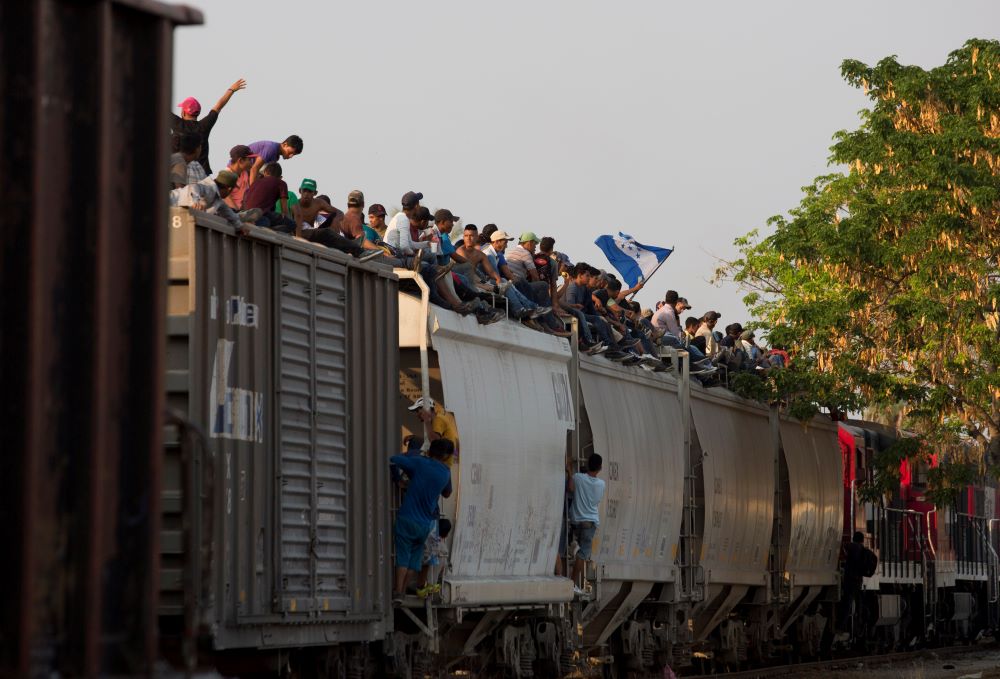
Central American migrants ride atop a freight train during their journey toward the U.S.-Mexico border, in Ixtepec, Oaxaca State, Mexico, in this April 23, 2019 file photo. One shelter reports that 34% of migrants through Mexico go by foot, 26% take the train, and 19% travel by bus, while the rest take other methods or a mix of methods. (AP/Moises Castillo, File)
As the rumbling train speeds past, the women stand on the side of the tracks swinging bags of food tied together. When they see migrants leaning off the train or sitting on its roof, Las Patronas execute practiced handoffs and precise tosses of their food and water bottles.
Since 1995, when Norma Romero Vasquez and her sister spontaneously decided to give their groceries to passing migrants on the train who told them they were hungry, Las Patronas have been committed to "knowing God through the migrant," said Romero Vasquez, who serves as the group's coordinator.
The small group of women, now numbering 12 volunteers, is named after their rural community of Guadalupe, or La Patrona, in the state of Veracruz, Mexico. Their Instagram account declares that St. Mary of Guadalupe is their "patrona," or patron saint.
Since that day in 1995, Las Patronas have observed the fluctuations and changes in northward migration as national policies shift and conditions in migrants' home countries change. At one point, they were serving 800 meals a day.
Scalabrini Fr. Pat Murphy, who is director of the Scalabrinian Casa del Migrante in Tijuana, Mexico, called Las Patronas "national icons." He said supporting migrants "comes from the Catholic heart of service."
Eileen Díaz McConnell, a professor in the School of Transborder Studies at Arizona State University, said that riding a freight train through Mexico, often called "La Bestia" or "the beast," "is a very dangerous journey, physically dangerous because a lot of people get injured by La Bestia."
"There's enormous amounts of robbery and corruption and bribery that occur along the roof. There's a significant risk in terms of sexual assault that can happen for both men and women and trans people as they're crossing through Mexico on La Bestia. And it's a very long ride, and you're exposed to the elements," explained Díaz McConnell, who is Catholic.
Murphy said that people choose to continue using La Bestia for two reasons. "One, it's cheap," he said. "Secondly, it's just the tradition, you know, my father went there, my uncle went there, my cousin went there. I'm gonna go the same way."
'[Migrants are] people of struggle. They are people who dream. They are people who long to live and be well."
—Norma Romero Vasquez
When Las Patronas began their work, migrants using La Bestia were primarily young men, but now they see women, children and older adults on La Bestia. "It's very dangerous for young people," said Romero Vasquez. "Imagine it for older adults."
Additionally, migrants used to ride La Bestia for free, but now, they have to pay a fee to the gangs to avoid being pushed off the train, she said.
Ignacio Martínez, director of ABBA, a migrant shelter in Celaya, Guanajuato, said that, after the rail lines were privatized in 1995, the companies sent armed private police to patrol the trains. Some of these private police also extract fees or demand sexual favors from migrants, said Martínez.
Since then, the journey has become more perilous because train companies have increased the speed of trains to dissuade migrant riders, multiple shelter directors told NCR.
Martínez said that, contrary to his promises, Mexican president Andrés Manuel López Obrador, has made life harder for migrants passing through Mexico and picked a fight with nonprofits who serve migrants.
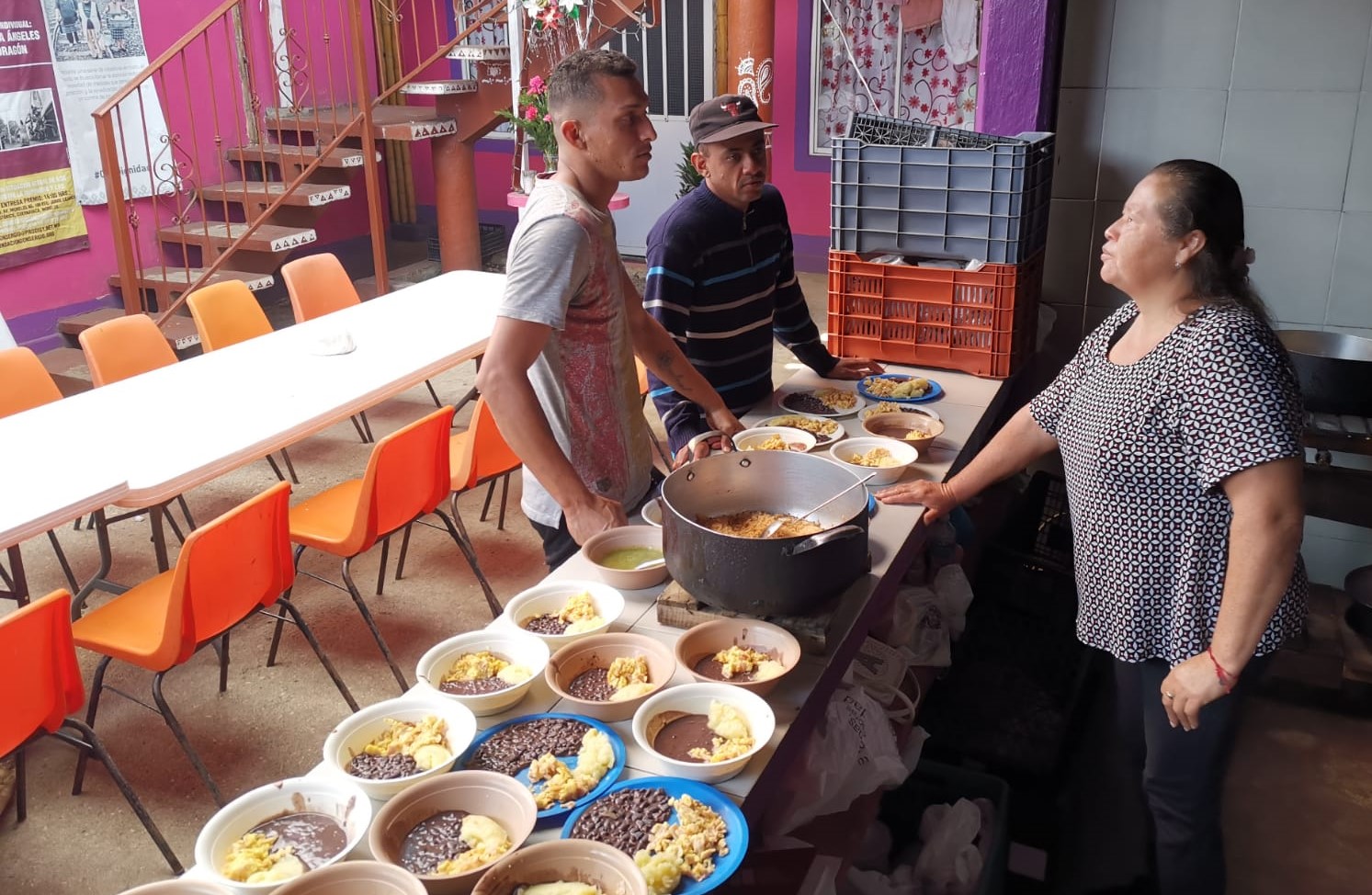
Norma Romero Vasquez of Las Patronas is seen in the collective's shelter. Las Patronas first began feeding migrants on La Bestia, freight trains crossing Mexico to the U.S., in 1995. The group runs a shelter where they provide food, a place to rest and clothing. (Courtesy of Las Patronas)
"He militarized it more. He made it harder, and he made migrants more invisible," said Martínez, who said human rights abuses of migrants have increased because of López Obrador's decision to send military police to the train routes.
After López Obrador's campaign promises of taking soldiers off the streets and "hugs, not gunshots," within his first months in office he created a national guard that combined military and civilian police under a single command, which he said would "prevent and combat crime" and increase discipline.
Romero Vasquez said that she doesn't believe that governments will ever be forces for positive change. "We only believe in God and in civil society that can make changes," she said.
While the train used to be the dominant way of crossing the country, Luis Enrique González-Araiza, the executive director of FM4 Paso Libre, said things have changed. "After the second decade of the 21st century, the train stopped being the only way to move across the country," he said.
Based on intake interviews as part of a greater Mexican network of shelters, ABBA reports on its website that 34% of migrants through Mexico go by foot, 26% take the train, and 19% travel by bus, while the rest take other methods or a mix of methods.
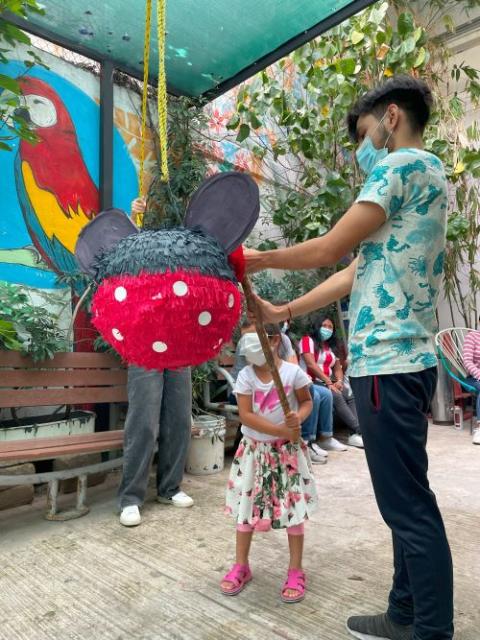
A migrant child celebrates a birthday in FM4 Paso Libre's shelter. FM4 Paso Libre, based in Guadalajara, Mexico, supports migrants through humanitarian assistance, research and advocacy. (Courtesy of FM4 Paso Libre)
Now that migrants pass through La Patrona without riding on La Bestia, Las Patronas run a shelter where they provide food, a place to rest and clothing. They have relationships with doctors at the local clinic and hospital, where they can take migrants to be treated for free.
Over their decades of work, Las Patronas gained national and then international renown, and, throughout Mexico, other organizations supporting the riders of La Bestia began to form.
Las Patronas and the Romero family "inspired me to go to the tracks, to do something," said Martínez, an evangelical Christian pastor and lawyer. Martínez and his family began supporting Central American migrants who passed through his city of Celaya in Guanajuato in 2012.
In 2015, they opened a shelter, ABBA, where migrants can receive shelter, food, showers, new clothes, medical, psychological and legal help, education classes and art workshops.
In addition to short-term help for migrants passing through Celaya, ABBA serves asylum seekers, who spend more time in the shelter during their legal process. They also serve vulnerable and traumatized migrants who need to stay longer in the shelter, such as survivors of sexual assault who need medical care, as well as migrants who are getting prosthetics after losing limbs on La Bestia.
While some migrants lose limbs after being pushed off the train, others are so dehydrated and sleep-deprived that they fall asleep on the train and fall off, Martínez said. ABBA partners with the Red Cross to support amputees as they receive prosthetics and recover.
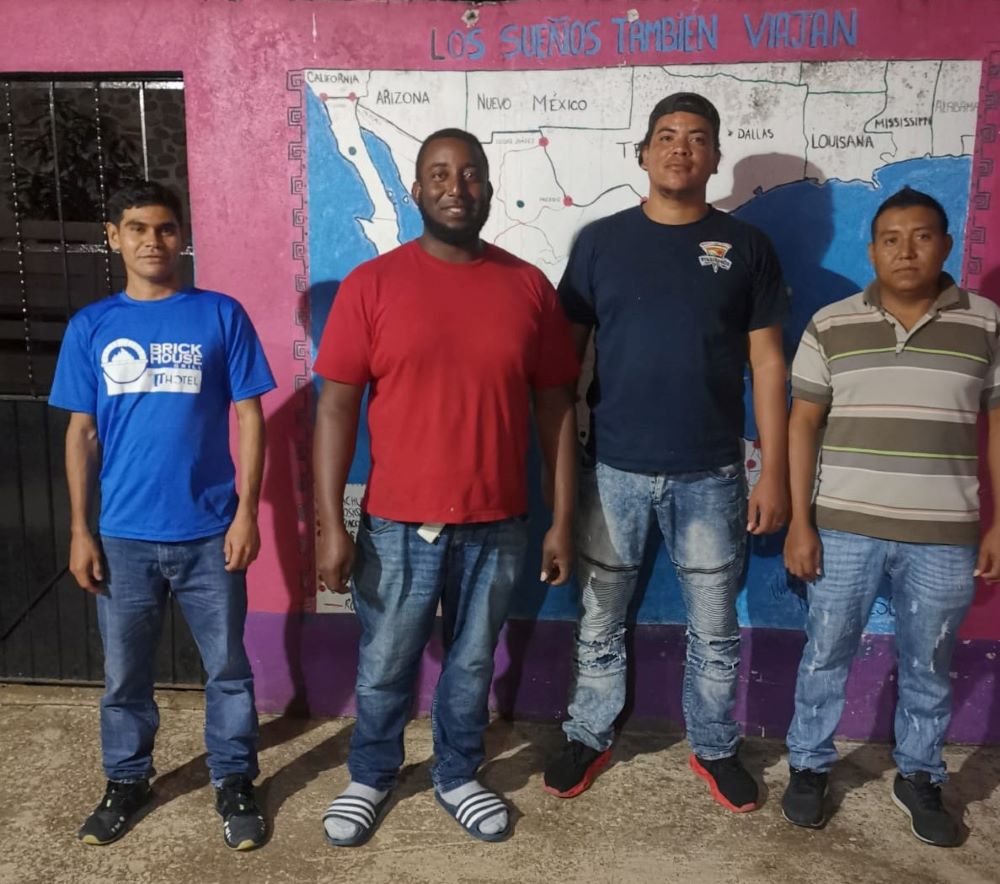
Young migrants who applied for asylum to stay in Mexico pose in front of a map of migration routes. (Courtesy of Las Patronas)
González-Araiza, the executive director of FM4 Paso Libre, a nonprofit organization in Guadalajara, Mexico, that supports migrants through humanitarian assistance, research and advocacy, said that Las Patronas were influential in the founding of his organization, which began as a collective of university students before institutionalizing as a nonprofit.
González-Araiza, who also teaches international law classes in immigration and human rights, said that the students who founded the collective in 2007 had volunteered with groups supporting migrants, including Las Patronas, as well as with Fr. Pedro Pantoja of Saltillo and many Scalabrinians.
"Many of us were in shelters having experiences, and with Norma [Romero Vasquez] it was fundamental. The service model that we have, we took from all of those experiences."
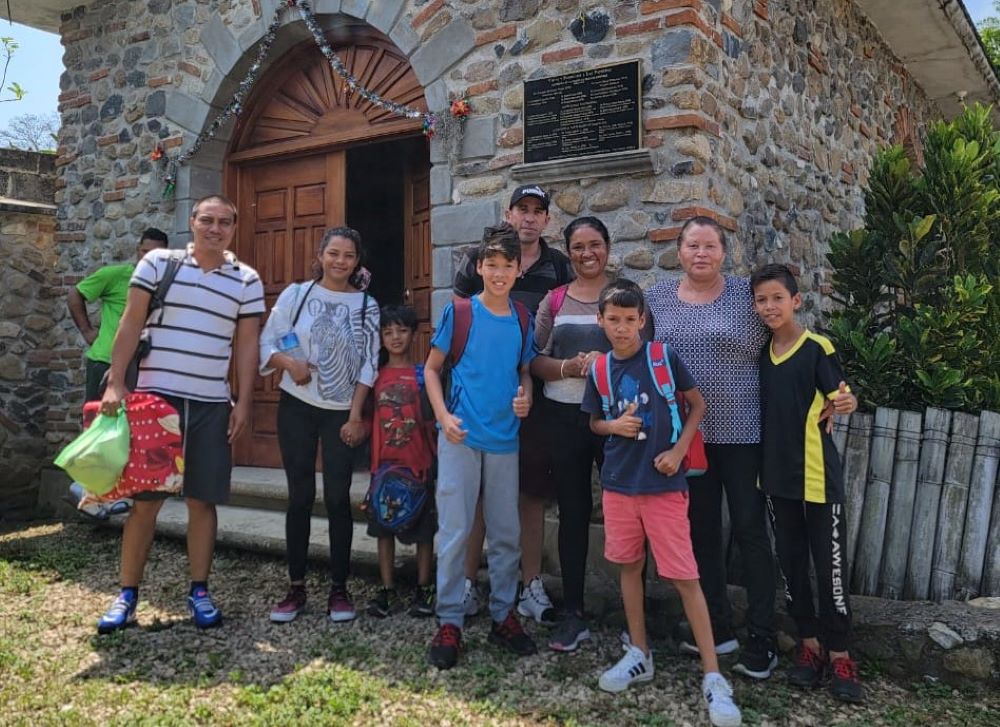
Norma Romero Vasquez (second from right), coordinator of Las Patronas, stands outside a church with migrant families. (Courtesy of Las Patronas)
Today, FM4 Paso Libre operates a shelter less than 150 meters (500 feet) from the train tracks where migrants can receive meals, a place to sleep, clean clothes, medical and psychological attention and legal help.
ABBA and FM4 Paso Libre began as collectives like Las Patronas, but Martínez and González-Araiza say that taking on formal nonprofit status has allowed them to provide greater services and distinguish themselves from the organized crime that preys on migrants as they go north.
With their international fame, Las Patronas are able to continue to operate as a collective through a model that would be challenging to replicate. They depend on donations from their many well-wishers and receive speaking invitations from around the world, giving them the opportunity to tell others about their work.
Advertisement
Romero Vasquez felt the presence of God in the support Las Patronas have received. "God won't leave us alone, right? Because he has never left us," she remembers saying.
"We are respecting what God has given us, what God has put in our hands, and we have taken care of it," like the Matthew 25 parable of the talents, Romero Vasquez said of Las Patronas' decision to continue as a collective.
But Las Patronas haven't always had overwhelming support.
When Las Patronas first began feeding migrants on La Bestia, they encountered pushback from their own community. "They said when we started that we were crazy. How could we be helping those people who could be delinquents, who could be people who do harm?" said Romero Vasquez.
However, when she got to know migrants, Romero Vasquez said, "I realized that they were people of struggle. They are people who dream. They are people who long to live and be well."
Before beginning her service to migrants, Romero Vasquez said that she felt something was missing as she went to Mass and served as a catechist. "The only thing I wanted was to help, in other words, to serve God, but they wouldn't let me," she said.
Romero Vasquez, whom some migrants call "mother," said, "When you do things for the love of God, life changes. It changes you completely."
"We are the church, and we have to give testimony to the faith we profess," she said of her service.








